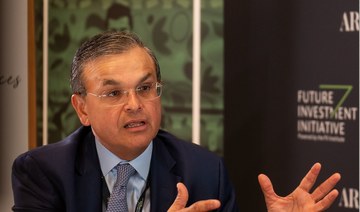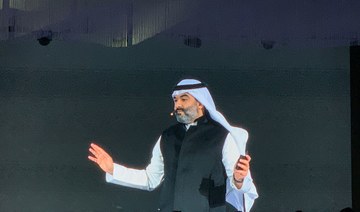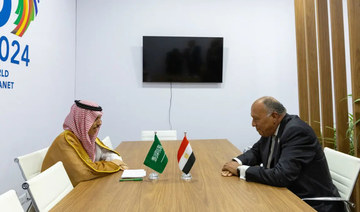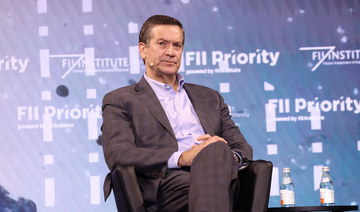BERLIN: Germany’s vice chancellor is stepping up an appeal for the country’s residents to save energy after Russia’s Gazprom announced significant cuts in natural gas deliveries through a key pipeline.
State-owned Gazprom announced on Tuesday that it was cutting gas flows through the undersea Nord Stream 1 pipeline to Germany by 40 percent, then, a day later, announced a further cut that brings the overall reduction to about 60 percent.
In both cases, it cited a technical problem, saying that Canadian sanctions over the war in Ukraine prevented German partner Siemens Energy from delivering equipment that had been sent for overhaul. The German government rejected that reasoning, saying that maintenance shouldn’t have been an issue until the fall and the Russian decision was a political gambit to sow uncertainty and push up prices.
Russian President Vladimir Putin “is doing what was to be feared from the beginning: He is reducing the volume of gas, not in one go but step by step,” German Vice Chancellor Robert Habeck said in a video posted by his ministry on Twitter Wednesday night. He pointed to earlier Russian moves to cut supplies to Bulgaria, Denmark and others.
The reduction in gas flows comes as Germany and the rest of Europe try to reduce their dependence on Russian energy imports. Germany, which has Europe’s biggest economy, gets about 35 percent of its gas to power industry and generate electricity from Russia.
The German gas regulator confirmed on Thursday that gas flows through Nord Stream 1 had fallen to about 40 percent of capacity. But it said it could not confirm that the reduction was caused by the technical problem Russia cited, the shutdown of a turbine at a gas compressor station.
The Federal Network Agency of Germany said it had no concerns about German gas supplies, saying storage facilities were significantly fuller than in previous years.
The news of the reductions sent short-term natural gas prices sharply higher in Europe. Month-ahead spot prices rose 13 percent Thursday to 139.10 euros per kilowatt hour, up 40 percent since Monday.
Habeck, who is also the economy minister, already had launched a campaign for people to save energy last week. After the Gazprom announcements, he hammered home the message in Wednesday night’s video.
“Gas is coming to Europe — we have no supply problem, but the volumes of gas must be acquired on the market and it will get more expensive,” Habeck said. He said the government is prepared, and noted that it has enacted legislation requiring gas storage to be filled.
He lauded the willingness of Germans and business to save energy and store gas.
“Now is the time to do so,” he said. “Every kilowatt hour helps in this situation. It is a situation that is serious, but not a situation that endangers supply security in Germany.”
Germany steps up calls to save energy as Russia reduces gas
https://arab.news/76cfv
Germany steps up calls to save energy as Russia reduces gas

- State-owned Gazprom announced on Tuesday that it was cutting gas flows through the undersea Nord Stream 1 pipeline to Germany by 40%
- Then, a day later, announced a further cut that brings the overall reduction to about 60%
Standard Chartered Bank aims to boost Saudi-China economic ties with strategic expansion

RIYADH: Saudi Arabia offers significant growth potential for foreign banks operating in the Kingdom to meet the increasing demand from Chinese clients, according to a senior banker.
Speaking to Arab News, Jerry Zhang, CEO of Standard Chartered Bank China, noted that the company is strengthening its infrastructure and services to better support Chinese clientele in Saudi Arabia, indicating confidence in the market’s potential.
Zhang said: “We are actually hiring a corridor banker. Corridor banker, meaning that a Chinese-speaking local relationship manager is servicing the underlying clients. So, we are hiring additional resources to be stationed in Saudi to serve the Chinese clients here. This is absolutely driven by the demand.”
She added: “We are also beefing up supporting systems and services capabilities to serve Chinese clients here onshore. That’s a straightforward proof of how we see the potential of this market.”
Standard Chartered’s banking presence in the region is relatively new, as it commenced operations in Saudi Arabia in 2022.
However, the corridor between the Middle East and China already contributes 10 percent to the bank’s income and is experiencing rapid growth.
“Hopefully, in 12-24 months’ time, we will see the share of the Middle East corridor within the entire China origination income grow faster, particularly in Saudi Arabia, and I can claim a large share of that and report it to you,” Zhang said.
Additionally, the CEO underlined that Saudi Arabia and China align strategically. The Kingdom is actively seeking diversification in its economy, particularly in sectors like infrastructure, new energy, technology, logistics, and e-commerce. These sectors are recognized as key areas where North Asian companies excel.
“Therefore, I think Chinese companies do have an edge and also an urge to come across to Saudi Arabia to provide their products and services, expanding into this part of the world very fast. In our Standard Chartered’s position, we’ve been consistently transitioning to support the so-called emerging new economy in China for the past eight to 10 years,” Zhang continued.
The CEO underscored that new economy sectors, such as technology and innovation, have experienced significant growth and now contribute nearly 50 percent of the firm’s corporate income.
This transition aligns strategically with both countries’ goals and supports Saudi Arabia’s Vision 2030 by providing services in sectors relevant to its objectives.
Zhang further elaborated on the development of the Chinese economy, highlighting its 5.2 percent growth rate last year, which is considered strong compared to other major economies.
She anticipates a 4.8 percent growth rate for 2024, primarily driven by consumption and growth in these rising industries.
“More than 30 million cars have been produced and sold. For the first time in history, China has exceeded Japan to become the No. 1 exporter of cars worldwide, and for EV (electric vehicle) cars in particular, last year, I think China has produced close to 10 million EVs and more than 30 percent in the penetration ratio,” Zhang said.
Commenting on the relationship between the North Asian country and Saudi Arabia, Zhang said that Standard Chartered China has engaged with the Kingdom’s leadership team and women entrepreneurs in technology, whom they have sponsored and supported through programming.
“First, we saw the bilateral relationship really accelerate after President Xi’s visit. By the end of 2022 and during the investment conference, both sides had signed more than 60 agreements worth more than $25 billion in contracts, which is extremely exciting, and things have been moving even faster from there,” Zhang commented.
She added, “The two central banks have signed a currency swap program worth 50 billion RMB, which will pave a very strong foundation for financial collaboration between the two nations as well... We are seeing this extremely friendly government-to-government relationship that further nurtures the economic ties between the two sides.”
The bank is enhancing its presence by adding more personnel, introducing new products and solutions, and implementing best practices from its global operations in the Kingdom.
Mazen Bunyan, CEO of Standard Chartered Saudi Arabia, emphasized that the Kingdom and China share a historic and long-standing relationship. Additionally, both nations have very similar strategies for achieving their economic growth, diversification, and objectives.
“We have a very unique opportunity and position as a global bank in both markets to leverage on that network, on connectivity. We’re expanding on the market. We’re expanding our operations, and adding people, products and services on the ground, and solutions,” Bunyan told Arab News.
He added: “At the same time, we continue to engage with key stakeholders on each side, China and Saudi Arabia, to smooth the knowledge gap to help the engagement between the two counterparts or two countries.”
Bunyan highlighted that the bank has around 50 employees working directly in the Kingdom, the majority of whom are Saudi nationals. Additionally, a significant number of women leaders are present within the organization’s regional workforce.
“We have also a very huge portion of women leaders within both entities, and we continue to invest in talent in Saudi Arabia and develop them as well in line with the Vision 2030 Human Capital Development Program,” Bunyan said.
Standard Chartered Bank in Saudi Arabia operates as a full-fledged wholesale organization, focusing on serving government and quasi-government financial institutions as well as large and global companies in the Kingdom. The bank’s objective is to deliver value to these clients and support them in achieving their respective objectives and strategic priorities.
The financial institution plays a significant role in facilitating inward business into Saudi Arabia, leveraging its extensive global footprint, particularly in regions like China.
Additionally, Standard Chartered assists international companies in establishing their presence and operations in the Kingdom, serving as a bridge between these companies and the Saudi market.
Saudi Arabia named ‘most improved country overall’ in US Chamber of Commerce IP Index

RIYADH: Saudi Arabia has received recognition as “the most improved country overall” in the 12th edition of the US Chamber of Commerce International Intellectual Property Index.
Released on March 2, the report emphasizes the several achievements of the Kingdom, with Vice President of Middle East Affairs at the US Chamber of Commerce Steve Lutes telling Arab News that Saudi Arabia has made significant strides in the technology sector over the past year.
“Specifically, I think this year the Kingdom did sign on to some important international treaties and they’ve made some other progress on both the enforcement side and some other of the indicators,” Lutes said on the sidelines of the LEAP 2024 conference.
“The Kingdom moving up in ranking gives more confidence to investors,” he added.
Lutes went on to say that the body aims to encourage partnerships with the business community, government, and academia in Saudi Arabia to drive the establishment of a diversified, knowledge-based economy aligned with Vision 2030.
The US Chamber of Commerce considers over 50 indices when ranking countries, Lutes added.
“Some of this looks very marginal. But really, when you think about it from an economic perspective, these are very important drivers because these are the sorts of things that companies look at. Is my IP going to be safe? Is it going to be protected? Are rules going to be enforced? And that’s where you get the investment in value and innovation,” said the vice-president.
The Kingdom allocates a total of $2 million across all funding rounds dedicated to artificial intelligence companies and over $3 billion proportional to gross domestic product with a ranking position of 31 in the Global AI index.
“We’ve been looking at this as governments around the globe start to grapple with the regulatory frameworks for artificial intelligence. The Chamber commissioned a report that was largely targeted toward a domestic audience and had some policy recommendations in that,” said Lutes.
A report by the European Centre for International Political Economy and the US Chamber of Commerce, titled “The Opportunity of Artificial Intelligence: Boosting Productivity and Growth in Saudi Arabia,” will be released in March.
The study will include a breakdown covering the benefits of AI for the Kingdom, endowments and digital industry structures, and AI policies going forward.
“It has some sector-by-sector analysis where we think it can be the most impactful. In my mind, though, the biggest message is for policymakers,” Lutes said, adding: “One of those is investing, for example, in human capital. You have to have the workforce that’s ready to take on these technologies and bring it to government processes, to business processes and see it diffuse. So, when it comes to the sectors, I think, you know, healthcare and education are two that are highlighted in particular as having the most upside.”
Lutes added this is his first time attending LEAP, which is now in its third edition, and the Chamber has been collaborating with the Ministry of Communications and the Saudi Authority for Data and Artificial Intelligence.
“We are at the LEAP Conference and IP is so fundamental to that. So, kudos to the Kingdom this year. And I guess our message is let’s not rest on our laurels. Let’s continue to work together to see if we can continue to see the Kingdom climb in that index as well,” he concluded.
LEAP, held in Riyadh from March 4-7, is an annual premier tech event founded in 2022 by the Ministry of Communication and Information Technology. It convenes leading professionals from the sector to deliberate on the industry’s future and the innovative opportunities ahead.
Prince Mohammed bin Salman College, Saudi Press Agency sign training agreement
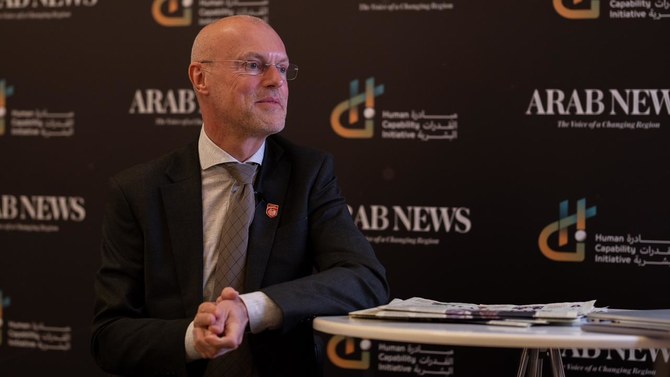
- MBSC will train journalists in ‘interpersonal effectiveness skills,’ such as negotiation and presentation
RIYADH: The Prince Mohammed bin Salman College for Management and Entrepreneurship announced on Thursday a new partnership with the Saudi Press Agency to provide specialized training and development programs for the Kingdom’s news industry.
The partnership was co-signed by Zieger DeGreef, dean of MBSC, and Fahad bin Hassan Al-Aqran, president of SPA, during the “Human Capabilities Initiative” conference held in Riyadh on Feb. 28-29.
“We are proud to partner with the Saudi Press Agency,” DeGreef said. “We are proud to partner with a number of very prominent ministries and organizations in the Kingdom to develop business acumen in Saudi Arabia.”
He told Arab News that the partnership will train journalists in a variety of “interpersonal effectiveness skills,” such as teamwork, negotiation, presentation, influencing, decision-making, and communication — all of which “are very relevant for journalists (and) for professionals in the media.”
DeGreef added that although “there is already good education in the Kingdom,” it has “a long way to go in excellence in business education.”
He added: “The college tries to fill that void.”
In addition to joining media-focused training programs under the agreement, Saudi journalists will also be able to obtain graduate degrees in business administration and finance.
“We will welcome journalists in those degree programs in business, but we are also developing an exciting portfolio of executive education programs again for the media,” DeGreef said. “So, most of our partnerships are already in those two areas, but the third area is research.”
He highlighted that MBSC’s faculty “will work with journalists from SPA on particular research projects, mostly linked to data, data analysis, data presentations, (and) data communication.”
SPA announced on Thursday the launch of its first news training academy in partnership with several organizations, including the Technical and Vocational Training Corporation, the Prince Mohammad Bin Salman College of Business and Entrepreneurship, the Institute of Public Administration, the Human Resources Development Fund, Sky News Arabia Academy, and the Austrian International Center for Qualification and Quality.
UAE invests $35bn in development of Egypt’s Mediterranean coast region

- The deal, signed by a private consortium led by ADQ, a sovereign investment fund based in Abu Dhabi, is the single largest foreign direct investment in Egypt
LONDON: The UAE, represented by a private consortium led by ADQ, a sovereign investment fund based in Abu Dhabi, signed a landmark agreement with Egypt on Friday to invest $35 billion in Ras El-Hekma, a region on the Mediterranean coast 350 kilometers northwest of Cairo. It represents the single largest foreign direct investment in Egypt.
“In addition to acquiring the development rights for Ras El-Hekma for $24 billion, ADQ will also convert $11 billion of deposits that will be utilized for investment in prime projects across Egypt,” the Emirati state news agency, WAM, reported.
“The vision is to develop the region into a leading, first-of-its-kind Mediterranean holiday destination, financial center and free zone spanning over 170 million square meters and equipped with world-class infrastructure to strengthen Egypt’s economic and tourism growth potential.”
The Egyptian government will retain a 35 percent stake in the development.
Mohammed Hassan Alsuwaidi, the Emirati minister of investment, said: “With this signing, a new chapter begins in the long-standing bilateral relations between our two nations.
“Underscored by mutual respect and trust, this investment demonstrates the UAE’s commitment to supporting the government of Egypt in realizing the abundant potential of the local economy.
“As a large-scale infrastructure project, the planned Ras El-Hekma development will foster widespread impacts across multiple sectors, be a catalyst for job creation, and attract significant additional foreign direct investments in the years to come.”
ADQ said work to build the “next generation city” over 170 square kilometers — nearly a fifth of the size of Abu Dhabi city — would begin in early 2025. The city would feature investment zones, technology and light industry, amusement parks, a marina and an airport as well as tourism and residential developments.
Egyptian Prime Minister Mostafa Madbouly told a press conference that the deal would bring in $15 billion in the next week and $35 billion over two months — though he said $11 billion of that money would be converted into Egyptian pounds from existing UAE dollar deposits in Egypt’s central bank.
(With Reuters)
Middle East and the US are leading in AI adoption, says Palantir CEO
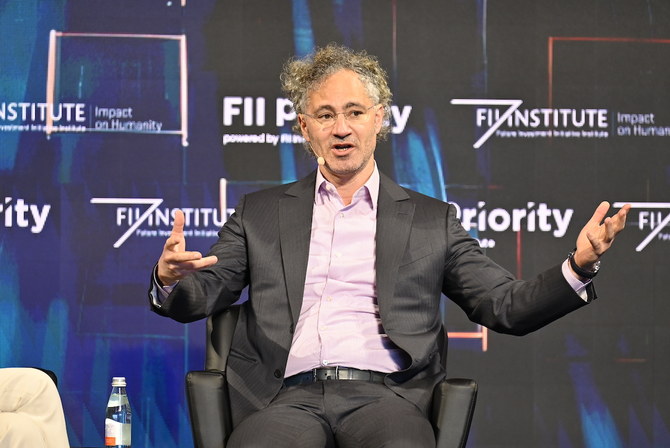
- It is time to throw out the playbook in order to succeed, says Alex Karp
MIAMI: Alex Karp, CEO of data mining and AI-assisted software firm Palantir, believes “that the world will be shaped through the embodiment of ideas and words in software platforms.
“These platforms are so levered that, in fact, they will shape our life in a way that words used to,” he said at the FII Priority Summit in Miami on Friday.
In order to succeed in today’s world, it is essential to think outside the box and outside any playbook — whether that is in finance, hardware, or any other sector, he said.
“What’s super interesting about the AI revolution is that almost none of the playbook rules make sense,” he added.
The countries adopting AI and utilizing it to its full potential are in the US and in the Middle East, Karp continued.
“In hardware, the value is having a community of people who are all very good, and in software, the value is having the one right person.”
It seems like a small difference but it is not; it is largely the reason attempts to build ecosystems like Silicon Valley have failed, “because the people building them are not software natives,” said Karp.
He continued that it is perhaps why countries like Saudi Arabia and the UAE are “embracing these technologies in a way that I wish other places in West Europe would.”
Armed with a background in social sciences and academia, 20 years ago Karp co-founded Palantir, which received early backing from CIA investment arm In-Q-Tel and does contract work for government agencies like the US Department of Defense, the Federal Bureau of Investigations and the Danish National Police.
Addressing the balance between privacy and ethics, Karp said that the company’s core intel products deal with privacy issues “by exposing authorities and only authorities to the data they’re allowed to see without seeing the other data that they’re not allowed to see.”
He said: “I’m very pro civil liberties but you have to augment both civil liberties and GDP and they’re not in contradiction.”
It is often “people who are allergic to technical issues (that) are actually the adversaries of the enlightenment, because if your enterprise doesn’t work, your country doesn’t work, and nothing can work,” said Karp.
At a time when the world is riddled with war, and these wars are happening “in very complicated electronic suppressed environments,” one cannot use old hardware anymore, said Karp.
“You have to engage in software war and almost all useful hardware things going forward will be software-enabled or controlled.”
Data ownership and privacy are even more critical amid increasing geopolitical tensions, so “your products have to work in an environment where you can understand your supply chain even as it’s disrupted” and even potentially predict disruptions, he continued.
“Treat your company and all of its latent assets as a portfolio under the condition that the portfolio will be very different tomorrow than it is today.”
Karp sees the future of AI as still undecided.
“This is a place where the innovation ramp is so great that the most important thing really is what do you do in the next 18 months.”
For the US, the testing ground for this technology is currently in the military, he added.
“What will be decided is, can America and its allies get to a point of decisive dominance and then impose regulation on the rest of the world from that perspective of dominance? That would be the best outcome,” concluded Karp.





